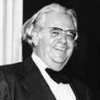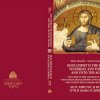Sidebar
Site Map
A great man is one who collects knowledge the way a bee collects honey and uses it to help people overcome the difficulties they endure - hunger, ignorance and disease!
- Nikola Tesla
Remember, remember always, that all of us, and you and I especially, are descended from immigrants and revolutionists.
- Franklin Roosevelt
While their territory has been devastated and their homes despoiled, the spirit of the Serbian people has not been broken.
- Woodrow Wilson
Тhe Njegoš Fund for Serbian Studies at Columbia University
The Njegoš Fund for Serbian Studies at Columbia University was established in 1997 to promote language instruction and cultural studies at the University. The Serbian language program at Columbia, one of the oldest in North America, dates back to before World War I, when Mihajlo “Michael” Pupin was a famous professor at Columbia. We at the University have tried to uphold this tradition by improving and expanding the program of instruction in Serbian studies and events for the community.
Instruction: During the last calendar year, 63 students enrolled in a score of International Affairs, Language and Comparative Literature, and Political Science courses that were offered in the South Slavic area. The figure includes language classes, taught now by Dr. Aleksandar Bošković, who was hired to replace Dr. Radmila Gorup; he also taught a course on Serbian culture. Using Njegoš funds, Dr. Gorup was brought back this fall to teach her signature course, “Within and Beyond Empires: Literatures of South Slavs.”
Lifeline Humanitarian Organization
YOUR HELP WILL MAKE ALL THE DIFFERENCE
Dear Friends of Lifeline,
Serbia continues to face humanitarian crises and your help is urgently needed. Serbia's aged medical infrastructure and poorly equipped healthcare system is unable to meet the demands of the nation, where cancer mortality rates are the highest in Europe - including the highest mortality rate from breast cancer - and are rising at 2.5 per year.
In addition to these shocking realities, Serbia is on the front lines of the regional migrant crisis as hundreds of thousands of migrants seek safety, passing through Serbian borders, needing shelter and emergency aid.
Your contribution will enable Lifeline to help address these urgent needs. In 2015 Lifeline, together with The HRH Crown Princess Katherine Foundation in Belgrade, accomplished many important goals, including: providing lifesaving equipment to the Clinical Centers of Gynecology and Obstetrics where several thousand examinations are conducted per month; supporting hospitals by providing the expertise and equipment to conduct breast cancer screening, testing made possible thanks to a grant from the Niarchos Foundation; and supporting educational efforts by sending doctors to Memorial Sloan Kettering and the MD Anderson Cancer Center for additional training. Lifeline also supports the annual Serbian Medical Diaspora Conference in Belgrade, attended by more than 400 doctors from throughout Serbia.
Decani Monastery Relief Fund
The Decani Monastery Relief Fund (DMRF) is a non-profit organization committed to assisting the people of Kosovo/ Metohija through the Decani Monastery located in Kosovo, by providing funds that may be used in ways which include but are not limited to the following:
- Providing daily lunches to schools.
- Providing shoes and clothing for youth.
- Supporting soup kitchens and bakeries.
- Rebuilding of seminaries, monasteries, and churches in the region.
- Providing humanitarian aid to refugee centers.
- Providing for special needs of the elderly.
- Paying electric bills.
- Providing firewood.
- Financing necessary medical and surgical procedures.
- Helping to purchase farm equipment and livestock.
- Providing scholarships to the University of Northern Kosovo when applicable.
Srpske organizacije i udruženja
Čikago
Serbian National Defense Council of America
5782 North Elston Avenue,
Chicago, IL 60646-5546, U.S.A.
Tel: (773) 775-7772
Fax: (773) 775-7779
E-mail: This email address is being protected from spambots. You need JavaScript enabled to view it.
Website: www.snd-us.com
Serbian Radio Chicago
P.O. Box 178491
Chicago, IL 60617
Tel: (773) 933-9180
Fax: (773) 933-9179
Monday - Friday from 3pm - 4pm CST on
WNWI AM 1080.
Also Monday - Friday from 2:00pm - 2:30pm
CST on WNDZ AM 750
Website: www.serbianradiochicago.com
Serbian Academic Club
28 East Jackson Boulevard
Suite 107-W, Floor S2
Chicago, Illinois 60604
Email: This email address is being protected from spambots. You need JavaScript enabled to view it.
Website: www.serbianac.org
North American Society for Serbian Studies
The North American Society for Serbian Studies (NASSS) is an organizational member of the Association for Slavic, East European, and Eurasian Studies (ASEEES), formerly American Association for the Advancement of Slavic Studies (AAASS). It is dedicated to promoting and enhancing knowledge of Serbian culture and society throughout North America, including the American and Canadian academic community, as well as the Serbian diaspora at large. The goal of the organization is to foster and support scholarly interests and research in disciplines such as language, literature, art, music, history, anthropology, sociology and political science. NASSS membership is open to all, scholars and supporters, who share these interests and goals.
.Serbian Orthodox Teachers, Youth and Young Adult Association
SERBIAN ORTHODOX CHURCH IN NORTH AND SOUTH AMERICA
Serbian Orthodox Teachers, Youth and Young Adult Association
S. O. T. A. Y. A. for the 21st Century
With the Blessings of the Episcopal Council of the Serbian Orthodox Church in North and South America and the support of the Central Church Council, we announce the reestablishment of the Serbian Orthodox Teachers and Youth Association. The purpose of this ministry is to unite the teachers, young adults, and youth members of the Serbian Orthodox Church in the Dioceses throughout North and South America. It is a special forum through which people will be brought closer together through a ministry of faith and fellowship.
MISSION AND GOAL OF SOTAYA MINISTRY
The world is constantly changing and every day seems to introduce a new trend and movement of youth culture. Most everyone agrees that growing up in today’s society heavily influenced by media and pop culture, is a much more difficult task than it was in previous times. They are also unprecedented technological developments and fundamental economic change. As a result, we live in a world which is more interconnected, more volatile, and more complex. In the process, our youth are being shaped by many negative and destructive influences, ones that can and will define who they are and who they will become. For this reason, we have the sacred responsibility to do all that we can to ensure that the positive teachings and traditions of the Orthodox Church become a living presence in their lives. The local church, its worship experience, education and fellowship opportunities are vital to the spiritual well being of all of us, most especially our younger generations.
.Serbian Book World
SerbianBookWorld.com is your quick stop to buying Serbian books and educational games in the USA.
Following your needs and wants, we started the website. Thank you for that.
Our mission:
To satisfy the need for Serbian books and educational games in the USA nurturing the Serbian culture far away from Serbia.
We are currently limited to the importation of products from Serbia, but we do cater to not only people from other former Yugoslavian countries but from all over the world as well.
.Serbian Institute
The Serbian Institute is a Washington based think tank, a public policy research institution whose mission is to educate the public and communicate information through multimedia aimed at promoting a better understanding of Balkan issues, and to broaden the parameters of public policy debate based on principles of equality and objectivity. SI relies on private financial support from individuals, foundations and corporations for its work.
.



